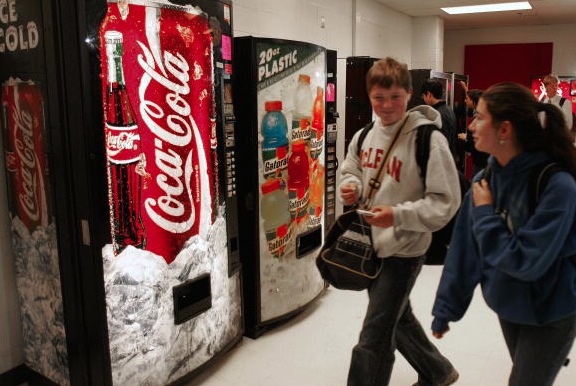Lack of sugary soft drinks and snacks in vending machines in some schools have left both students and schools hungry, thanks to a vending machine law enacted in some states across the country. The vending machine law demands that snack offerings made to students can only be of the non-sugary variety. Students hungry for their afternoon sugary snack can’t get it from a school vending machine, and kids being kids, they refuse to buy the healthy snack choices made available to them under the vending machine law. Schools have come to rely on money made from the vending machine snack purchases to buy essential classroom supplies. Less snacks sold from the school vending machines, the less money the school has, leaving schools hungry for money.
While teachers, school administration and parents are all in favor of encouraging and enabling school children to live a healthier lifestyle, it’s coming at the expense of their academic lifestyle.
The vending machine law in some states, including Tennessee, prohibit the sale of sugar laden carbonated soft drinks and sugary snacks to school children in grades pre-k through 8th. The vending machine law was enacted as a means to get school children healthier by only giving them healthy snack choices in vending machines during the school day like milk, fruit or vegetable juice and bottled water. Unfortunately, the healthy snack offerings in the vending machines are just not being bought at the same rate that sugary soft drinks and snacks were, and that leaves the schools hungry for money.
Tennessee schools used the money from the vending machine sales for copies and office supplies. One school can easily need over one million copies of test papers per year, and that amounts to a lot of money, money that is now having to be paid by the teachers if they exceed their copy limit of 500 copies every 9 weeks.
Teachers at Tennessee schools and teachers in other states that have enacted the vending machine law are having to change the way they teach and re-assess the amount they spend on classroom essentials. If their allotted classroom money is spent on books, markers and ink jets, then the teachers have to dip into their own pockets for money to make copies with.
Reportedly, the bottled water is not being bought from the school vending machines, but school students find ways to sneak into faculty lounges and purchase a can of Coke. Of course that raises the question if the vending machine law prohibits the sales of sugary drinks and snacks to students, shouldn’t all vending machines on school property be banned from containing them?
Source:
- http://www.timesfreepress.com/news/2008/apr/26/snackless-schools-hungry-funds/?print
- https://jitterymonks.com/obesity-essay-introduction-body-conclusion-thesis-examples-ideas-and-topics/

